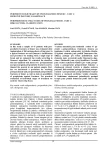-
Medical journals
- Career
COMPARATIVE STUDY OF LASER ASSISTED SUBACROMIAL DECOMPRESSION AND DECOMPRESSION PERFORMED CONVENTIONALLY
Authors: Libor Čech; Rudolf Ditmar; Aleš Spáčil
Authors‘ workplace: Klinika ortopedické chirurgie FN Olomouc ; Department of Orthopaedic Surgery ; Faculty Hospital and Medicine Faculty of the Palacky University Olomouc
Published in: Úraz chir. 13., 2005, č.4
Overview
Purpose of the study:
The authors performed a comparison study on a group of patients who underwent arthroscopic subacromial decompression (ASD) of both shoulders. One shoulder was operated conventionally with mechanical tools and the other using laser. The aim of the study was to compare the results after surgery and evaluate which method provides better outcomes for the patient.Material:
A group of 40 patients with II. stage of impingement syndrome of both shoulders was investigated. The average age of patients was 52 years. All underwent unsuccesful conservative therapy (which takes minimally 6 months) and none had any associated intraarticular diagnosis.Methods:
All patients were operated under general anesthesia by the first author. Conventional decompression included: bursectomy with shaver, acromioplasty with bone burr, discision of the coracoacromial ligament by punch. Laser assisted decompression included: bursectomy with shaver, acromioplasty with bone burr, discision of the coracoacromial ligament by laser. All laser assisted surgeries were performed with 2.1 μm Holmium: YAG laser Sharplan 2040 with power output 2.5W – 40W. No multiple intraarticular procedure was performed at the same time. The results were measured by UCLA shoulder rating scale.Results:
In the laser treated group satisfactory results increased by 10 % and excellent results increased by 15 %. No poor result was recorded.Discussion:
The use of laser is advantageous in arthroscopic surgery where postoperative bleeding has a substantial influence on satisfactory results. Discision of coracoacromial ligament by laser reduces postoperative bleeding, followed by pain reduction and shortened recovery time. These factors result in better outcomes measured by UCLA shoulder rating scale.Conclusion:
Arthroscopic subacromial decompression with the assistence of 2.1 μm Holmium: YAG laser provides more benefits than conventionally performed decompression.Key words:
impingement syndrome, laser, subacromial decompression.
Sources
1. AAOS ADVISORY STATEMENT. Use of lasers in orthopaedic surgery. American Academy of Orthopaedic Surgeons, 1993, 1–4
2. ABELOW, S. Use of lasers in orthopedic surgery: current concepts. Orthopaedics. 16, 1993, 5, 551–556.
3. BRILLHART, A. T. Arthroscopic laser surgery. Am J Arthrosc. 1, 1991, 1, 5–12.
4. BRILLHART, A. T. Lasers in arthroscopic surgery. Arthroscopy. 7, 1991, 4, 411–412.
5. BRILLHART, A.T. Arthroscopic laser surgery: the Holmium:YAG laser and its use. Am J Arthrosc. 3, 1991, 1, 7–11.
6. ČECH, L. Použití laseru při artroskopiích ramene. Zdravotnický týdeník Diagnóza. 2000, 8, 8–9.
7. ČECH, L. Impingement syndrom ramenního kloubu. Zdravotnický týdeník Diagnóza. 2000; 8, 12.
8. DILLINGHAM, M. F., PRICE, J. M., FANTON, G.S. Holmium laser surgery. Orthopaedics. 16, 1993, 5, 563–566.
9. FANTON, G. S. Uses of holmium laser in arthroscopy: multiple joint applications. Coherent Symposium on Advances in Laser Arthroscopy. 1991, Anaheim, CA.
10. FANTON, G. S., DILLINGHAM M. F.: 2,1 µm Holmium:YAG arthroscopic laser surgery of the shoulder. In: Brillhart, A. Arthroscopic Laser Surgery. New York: SpringerVerlag, 1995. 251.
11. FANTON, G. S., DILLINGHAM, M. F. The use of the Holmium laser in arthroscopic surgery. Semin Orthop. 7, 1992, 2, 102–116.
12. FANTON, G. S. Treatment of impingement syndrome of the left shoulder and torn glenoid labrum using the VersaPulse® surgical laser. A case report. Update in Orthopaedic Laser Surgery. 2, 1991, 4.
13. IMHOFF, A. LEDERMANN, T. Arthroscopic subacromial decompression with and without the Holmium: YAGlaser. A prospective comparative study. Arthroscopy. 11, 1995, 5, 549–556.
14. NEER, C.S. Anterior acromioplasty for the Chronic Impingement Syndrome in the Shoulder. A Preliminary Report. J. Bone Jt Surg. 54A, 1972, 1, 41–50.
15. PODŠKUBKA, A. Impingement syndrom a bolesti ramenního kloubu u sportovců. Acta Chir Orthop Traumatol Čech. 66, 1999, 2, 105–118.
16. PROCHÁZKA E., KARPAŠ K. Použití laserů v ortopedii. Acta Chir Orthop Traumat Čech. 65, 1998, 1, 8–10.
17. ROCKWOOD, C.A. JR, LYONS, F.R.. Shoulder Impingement Syndrome diagnosis, radiographic evaluation and treatment with a modified Neer acromioplasty. J Bone Joint Surg. 75A, 1993, 3, 409–424.
18. SMITH, C. F., JOHANSEN, W. E., VANGSNESS, C.T., et al: “Gas bubble” technique in laser arthroscopic surgery. Semin Orthop. 7, 1992, 2, 86–89.
19. WALKER, T. M. 2,1 µm Holmium:YAG arthroscopic laser surgery: Prospective report of 100 cases. In: Brillhart A, ed. Arthroscopic Laser Surgery. New York: SpringerVerlag, 1995. 299.
Labels
Surgery Traumatology Trauma surgery
Article was published inTrauma Surgery

2005 Issue 4-
All articles in this issue
- COMPARATIVE STUDY OF LASER ASSISTED LATERAL RELEASE OF PATELLA AND CONVENTIONALLY PERFORMED RELEASE
- COMPARATIVE STUDY OF LASER ASSISTED SUBACROMIAL DECOMPRESSION AND DECOMPRESSION PERFORMED CONVENTIONALLY
- PERIPROSTHETIC FRACTURES OF PROXIMAL FEMUR - PART I.: RISK FACTORS, CLASSIFICATION
- PERIPROSTHETIC FRACTURES OF PROXIMAL FEMUR – PART II.: TREATMENT, PROPHYLAXIS, CASES
- RESOLUTION OF POSTTRAUMATIC ALOPECIA BY MEANS OD EXPANDERS
- RECTUM AND ANAL INJURY
- Trauma Surgery
- Journal archive
- Current issue
- Online only
- About the journal
Most read in this issue- PERIPROSTHETIC FRACTURES OF PROXIMAL FEMUR - PART I.: RISK FACTORS, CLASSIFICATION
- RECTUM AND ANAL INJURY
- COMPARATIVE STUDY OF LASER ASSISTED LATERAL RELEASE OF PATELLA AND CONVENTIONALLY PERFORMED RELEASE
- COMPARATIVE STUDY OF LASER ASSISTED SUBACROMIAL DECOMPRESSION AND DECOMPRESSION PERFORMED CONVENTIONALLY
Login#ADS_BOTTOM_SCRIPTS#Forgotten passwordEnter the email address that you registered with. We will send you instructions on how to set a new password.
- Career

